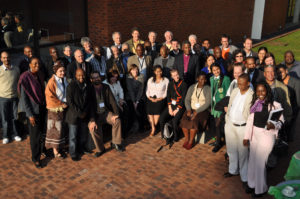In public discourse, migration is frequently approached as a problem. For some, it is a question of border control; for others, it is an economic issue, or a threat to national identity. This often makes it difficult to agree on migration policy and results in a lack of policymaking that condemns migrants to uncertainty.
Furthermore, a growing numbers of political leaders around the world are promoting a populist anti-migrant rhetoric that finds an amplifying echo in the media and enhances the dynamics of exclusion affecting migrants. Club de Madrid works to counter this trend by supporting an inclusive approach to migration policy and a positive public discourse around migrants
As our President, Danilo Türk, put it “Migration is a normal phenomenon for human beings. It’s the evidence of our nature, history and future”. It is also a global phenomenon that needs a globally coordinated response. This is why Club de Madrid is working alongside leading international and regional organizations to support the Global Compact for Safe and Orderly Migration, the first inter-governmentally negotiated agreement fostered by the United Nations, covering all dimensions of international migration.
Members of Club de Madrid, all former Presidents and Prime Ministers, actively employ their unique access to policymakers to consolidate inclusive approaches to migration. Together with partners, Club de Madrid disseminates the best examples of these inclusive policy practices:
Shared Societies: Exploring the links between migration and Agenda2030
Club de Madrid defines a ‘Shared Society’ as one in which all individuals hold status as equally contributing participants, free to express their differences while integrating their voices within the broader population. A ‘Shared Society’ respects everyone’s dignity and human rights, while providing every individual with equal opportunity to engage in policy development, implementation and monitoring.
For a few years now, our Shared Societies Project has been promoting an inclusive, rights-based approach to migration, one that is also anchored in the Sustainable Development Goals. Agenda 2030 is the best opportunity to create the conditions for migrants to choose to live in their home countries.
Here are some of our initiatives around migration:
-Our collaboration with the National Institute for Migration in the Dominican Republic actionable policy recommendations and best practices for managing migration.
-An Open letter: Response to the Global Compact for Safe, Orderly and Regular Migration.
-A Roundtable to address shifting migration flows in Latin America and the Caribbean.
Here are our plans for 2021:
-A joint initiative with the OAS to develop tools and resources for political leaders and public servants to foster a positive and inclusive narrative on migration, based on social inclusion and a recognition of the diversity of migratory experiences.
-Support a training plan to share best practices for local authorities responding to the massive exodus of Venezuelans to eleven countries in Latin America and the Caribbean
-Address the social exclusion drivers of migration, including differential realities for identity groups of targeted violence, poverty and economic exclusion in departure countries.
